

Decoding the Facebook Algorithm – Buffer — Social. If you do Facebook marketing, one thing that you might want to understand is the Facebook algorithm.

The Facebook algorithm helps make sense of the huge number of posts that people and businesses share every day and chooses the posts to show in our News Feed based on a huge number of factors. We want to help you understand how your Facebook posts get viewed on Facebook. So we’re collecting all the relevant Facebook algorithm factors, updates, and changes and placing them here in this post for easy reference. Read on, and see what goes into the complex, fascinating formulas of the Facebook News Feed. Facebook’s Ad Scandal Isn’t a ‘Fail,’ It’s a Feature - The New York Times. Thinking about facebook. Facebook now has 2 billion monthly users… and responsibility. “We’re getting to a size where it’s worth really taking a careful look at what are all the things that we can do to make social media the most positive force for good possible,” Facebook Chief Product Officer Chris Cox told TechCrunch about the company’s new milestone.
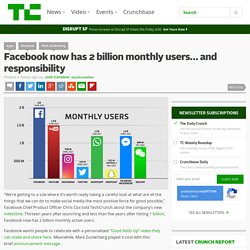
Thirteen years after launching and less than five years after hitting 1 billion, Facebook now has 2 billion monthly active users. Facebook wants people to celebrate with a personalized “Good Adds Up” video they can make and share here. Meanwhile, Mark Zuckerberg played it cool with this brief announcement message. Two billion makes Facebook the largest social app in terms of logged-in users, above YouTube’s 1.5 billion, WeChat’s 889 million, Twitter’s 328 million and Snapchat’s estimated 255 million (extrapolated from its December 2015 ratio when it had 110 million daily and 170 million monthly users). Gary Vaynerchuk Says You Should Go All-In on This Social Media Tactic… Most of us all know and love Gary.
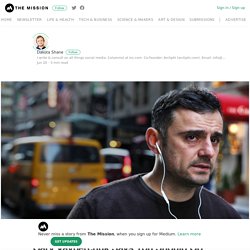
Through his no-bullshit style of guidance and content, business savvy and likable personality, he’s seemed to convert even his biggest naysayers over to (at least) respect him. On a personal level, Gary has had a big impact on my life. Both professionally and personally. I credit him and Mike Dillard with giving me the tools and inspiration to begin writing and to start my own business (for more on that, check this comment out). In his keynote at AdExchanger’s Industry Preview, regarding where we should be allocating our funds and attention to in advertising: “If you’re a practitioner, if you really had to sell to survive, you would realize that the most under-priced ad product right now is Facebook Advertising.
Gary went on to say that, recently, he has spent every dollar he has control over on Facebook Ads and Instagram influencers. How Facebook Makes Money Off You: The Economics of Social Networks. It’s pretty hard to exaggerate the influence Facebook has built since it launched in 2004.
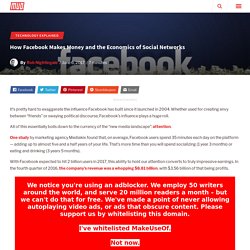
Whether used for creating envy between “friends” or swaying political discourse, Facebook’s influence plays a huge roll. All of this essentially boils down to the currency of the “new media landscape”: attention. One study by marketing agency Mediakix found that, on average, Facebook users spend 35 minutes each day on the platform — adding up to almost five and a half years of your life. Facebook clones Snapchat again with WhatsApp Status and Direct Photos. Not content with taking on Snapchat by shipping two clones of Snapchat Stories, attempting two acquisitions (one of Snapchat, one of a Chinese company making Snapchat-style camera apps), making four standalone Snapchat-style apps, bundling two ephemeral messaging implementations, and creating five new cameras with AR lenses, (see also here, here, here, here, here, here and here), Facebook is again shamelessly taking on Snapchat.
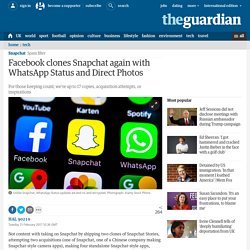
Twice. First up, on Monday, Android Police reported that the company began testing out a new feature in the Facebook app. Dubbed “direct photos and videos”, the feature is built into the camera in Facebook, and allows users to send pictures and movies to their friends straight from the camera interface, like in Snapchat. The recipient can only view the message twice, whether it’s a photo or video, before it disappears forever, like in Snapchat.
And, as Android Police puts it, “the camera itself seems to have some filters or something”, like in Snapchat. How technology gets us hooked. Not long ago, I stepped into a lift on the 18th floor of a tall building in New York City.
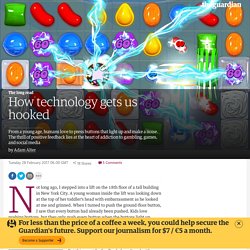
A young woman inside the lift was looking down at the top of her toddler’s head with embarrassment as he looked at me and grinned. When I turned to push the ground-floor button, I saw that every button had already been pushed. Kids love pushing buttons, but they only push every button when the buttons light up. From a young age, humans are driven to learn, and learning involves getting as much feedback as possible from the immediate environment. The toddler who shared my elevator was grinning because feedback – in the form of lights or sounds or any change in the state of the world – is pleasurable.
But this quest for feedback doesn’t end with childhood. The Facebook manifesto: Mark Zuckerberg's letter to the world looks a lot like politics. Name: The Facebook manifesto.
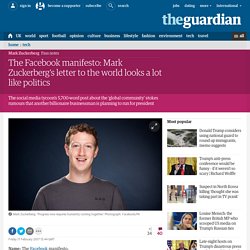
Age: One day old. Appearance: A 5,700-word Facebook post. Facebook revenge pornography trial 'could open floodgates' A legal case against Facebook, which will involve a 14-year-old taking the company to court in Belfast over naked images published on the social network, could open the floodgates for other civil claims, according to lawyers who work with victims of revenge pornography.
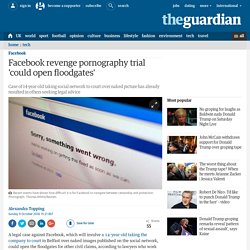
Facebook’s forthcoming trial, which centres on the claim that it is liable for the publication of a naked picture of the girl posted repeatedly on a “shame page” as an act of revenge, has alarmed the tech world and could have a seismic impact on how social media companies deal with explicit images. The case has already resulted in victims of revenge pornography seeking advice about whether they too could have grounds for legal action, according to Paul Tweed, media lawyer and senior partner at the law firm Johnsons. This is the news Facebook chooses for you to read. (Amy Cavenaile/The Washington Post; iStock) The Intersect ran a little experiment a few weeks ago: During the work day, we’d check in with Facebook each hour, on the hour, and record which topics were trending for us on the platform.
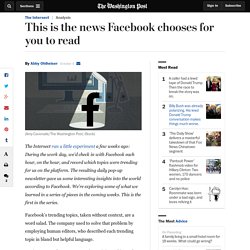
The resulting daily pop-up newsletter gave us some interesting insights into the world according to Facebook. We’re exploring some of what we learned in a series of pieces in the coming weeks. This is the first in the series. Facebook's dominance in journalism could be bad news for us all. Do the benefits of allowing social platforms to host your journalism outweigh the disadvantages?
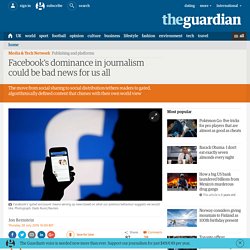
Most publishers, however reluctantly, will say yes and adopt the “we are where we are” argument. Others put a more positive spin on things, maintaining that publishers should go where their audience is, share what advertising revenue is available and trust that they can turn passing interest into loyal (paying) readership. Yet could it be that the short-term high from socially distributed content – greater reach – inevitably gives way to symptoms of dependency: loss of control and financial damage? Katharine Viner, the editor of The Guardian, has written and spoken of the effects of technology on the news business in recent week, making the argument that “social media companies have become overwhelmingly powerful in determining what we read and whether we make money”. Publisher obsession with algorithm changes and a willingness to give away control of content are evidence of this trend.
Race, politics, travel plans: things Facebook's algorithm can't get right. Facebook knows everything about you. At least that’s what we, and the advertisers it sells us to, are constantly told. But a peek behind its algorithmic curtains suggests what it does know might be wrong. As any of its 1.65 billion users can tell you, Facebook is constantly “updating” its privacy settings, which is why I tool through all my settings every few weeks. New Study Shows Facebook Reach Down 42% For many Facebook Page owners, the organic reach of posts is one of the most frustrating and hard to understand metrics to deal with. While it’s not the be all or the end all for marketers, that little number, always so visible when you’re on your Facebook Page, has a way of captivating us all. And when it doesn’t get as high as we expect, as has been the case for many these past few months, we’re left to question our methods.
Turns out, it’s not just you. According to a recent study of over 3,000 Facebook Pages, conducted by SocialFlow, publishers on Facebook have seen a pretty dramatic drop in reach over the last couple of months. When you first glance at the chart, it looks as though the reach of those posts has been fairly steady since the initial drop in January, hovering around 36 or 37 billion. Zuckerberg has given Facebook's investors all they need and he has just one request in return: control.
Mark Zuckerberg has dominated the desktop internet. He’s dominated the mobile internet. Now he’s going to dominate Facebook itself, and the company is probably going to let him. The big news that came out of Facebook’s quarterly earnings report is that the company is making more money, from more users, being shown more adverts – and more profitable adverts at that. How Facebook plans to take over the world.
It’s late afternoon on a blustery spring day on the waterfront at San Francisco’s Fort Mason, a former military base that’s now hired out for corporate functions. Vast warehouses, once used to store army supplies, are awash with sleek signs, shimmering lights and endless snacks. Behind them is an Instagram-ready view of Alcatraz island. In front, a fleet of Uber and Lyft cars lines up in the car park, while inside one of the warehouses Scottish synthpop band Chvrches take the stage. For the first few songs there’s only a small group of hardcore vocal fans at the front of the stage, flanked by a subdued mix of backpack-wearing dad types politely bobbing their heads, drinking cocktails out of plastic cups.
The shindig has been put on by Facebook for the benefit of delegates attending its F8 conference. The band is performing on the same stage from where Mark Zuckerberg has delivered the conference’s opening keynote speech. For this audience, it’s clear who the real rockstar is. Facebook is going to start showing you pieces people actually read. Facebook is changing its algorithm yet again, and this time it wants to show you more things that you’ll actually spend time reading or watching. The social network looks at a wealth of data when deciding which posts you actually see on News Feed, but until now it hasn’t cared too much about what you actually do when you click away from Facebook.
It says that’s going to change. “We’re learning that the time people choose to spend reading or watching content they clicked on from News Feed is an important signal that the story was interesting to them,” said software engineer Moshe Blank and research scientist Jie Xu in a post on the company’s website. As a result, the site will now attempt to pick links which have a higher reading time. But don’t think that you’ll have a News Feed filled with 30,000 word New Yorker epics. It seems that part of the reason for this change is that only recently has Facebook had enough data on user behaviour off-site to create the right metrics. Future - Facebook is a growing and unstoppable digital graveyard. The Number One Mistake People Make with Facebook Ads.
Facebook search tools take aim at Twitter’s relationship with news. Facebook is updating its search tool to make it easier for users to find things that interest them among the 2 trillion items archived by the company’s index. The update boasts personalized search suggestions, the ability to search through public posts in addition to those made by friends or family, and a new tool that allows people to view public conversations around news stories. 13 Tips for Creating Facebook Ads that Convert.
The big myth Facebook needs everyone to believe. ( J.J. Alcantara/The Washington Post; iStock) In the middle of January, in a change noticed nowhere but Spain, Facebook added six words to a single dialogue box — and inadvertently stumbled into a tortuous national debate. 5 Ways To Turn Facebook Messenger Into Your Best Customer Service Tool. Inside Facebook’s Decision to Blow Up the Like Button. How Facebook’s news feed algorithm works. Photo illustration by Lisa Larson-Walker. Photo by Tang Ming Tung/Getty Images. Every time you open Facebook, one of the world’s most influential, controversial, and misunderstood algorithms springs into action.
It scans and collects everything posted in the past week by each of your friends, everyone you follow, each group you belong to, and every Facebook page you’ve liked. 4 Ways to Use Dark Facebook Posts for Business Social Media Examiner. How to Improve Your Reach on Facebook. Your Facebook reach is declining. 5 Personal Tips For Increasing Facebook Engagement. Increasing Facebook engagement is one of the toughest challenges social media marketers face. Your Audience Rules – How Facebook’s News Feed Algorithm Really Works. Facebook users urged to check privacy settings. 6 Experts Reveal How to Easily Get More Facebook Traffic. How Facebook is changing our social lives. A day in the life of a Maltese Facebooker. From relationships to revolutions: seven ways Facebook has changed the world. 4 People Unfriended Me On Facebook, So I Decided To Ask Them Why. Facebook's new patent could make you rethink your friends list. 3 Ways to Use Facebook Groups for Business. Look Up.
Eli Pariser: Beware online "filter bubbles" Ello might or might not replace Facebook, but the giant social network won't last forever. Ello: the anti-Facebook meant to be private and pretty, but not this popular. It’s Complicated: Facebook’s History of Tracking You. Native Advertising Explained. Facebook privacy update lets the social network analyze your profile picture. Facebook: A visual history. Is the Facebook Like Dead for Marketers? The History of Facebook Advertising. THE FACES OF FACEBOOK.
Native Advertising: The Official Definition. Custom Facebook Info. Mashable Facebook Guide Book. How to Build a Facebook Audience From Scratch. Convincing a boss that Facebook marketing works. Rethink Facebook Marketing. Facebook Unveils the Most Powerful Social Ads of All Time. 7 Facebook Graph Searches That Will Give Your Business An Edge.
F**cked by Facebook - why politicians must become digitally literate. Online echo chambers: A study of 250 million Facebook users reveals the Web isn’t as polarized as we thought. Facebook interviews Central Station Amsterdam. The Beginner's Guide to Facebook. Facebook Cheat Sheet: A Guide To Getting Your Message Out. I'm 13 and None of My Friends Use Facebook. You Posted That on Facebook? Facebook use 'makes people feel worse about themselves'